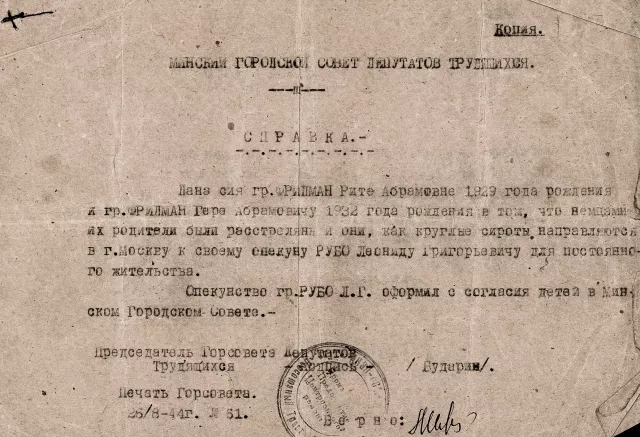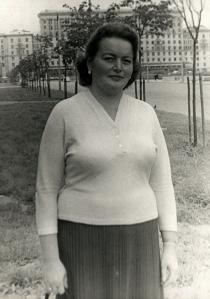Rita Kazhdan and her brother Georgy Fridman's certificate of participation in the Zorinskiy partisan group
This is a certificate verifying that my brother Georgy and I were members of the 106th partisan regiment for 9 months, from September 1943 to June 1944. I received the certificate in 1944.
During the war we were in the Minsk ghetto. My parents died there. Nearly all the people in the ghetto were annihilated. [In the summer of 1943] my brother and I began to prepare strenuously to become partisans. My brother went to make a reconnaissance. Having accomplished a dangerous 18-km march from the city to the East, he came to the village where we had rented a summer cottage before the war. The locals confirmed that the partisans were in the vicinity, but every night the Germans came to the village and conducted a search of each house, each corner of the cellars and lofts. My brother came back with no result. But such obstacles only intensified our desire to join the partisans.
Once, having covered over 30 km, we met partisans from the Semyonovsky regiment. But they were on their way to a military mission and weren't able to take us with them. They explained which village we had to go to, which hut to enter and where we should wait for their return. They kept their word: on the way back they took us along to the partisan district. Thus, we found ourselves in the Zorinskiy partisan group, as we got to know later, in the 106th regiment. They constructed shelters from fir boughs, gave us boots and two sheepskin coats. In the winter we moved to the central camp. We dug up potatoes, our principal food, in the burnt villages. Our regiment fought the last battle with the Germans in June 1944, when the Soviet army liberated Belarus. The Germans fell back. So for us the war was over on exactly this day.
The house in Minsk, in which our family had lived before the war, had burned down. For days on end my brother and I strolled about the ruined city. Fortunately, my uncle Leonid Rubo, the husband of dad's sister Fanya, arrived from Moscow within a week. He was deputy people's commissar [deputy minister] of the electrical industry of the USSR and was able to fly to Minsk to get us. He took us with him to Moscow. And we flew in a warplane. In Moscow we began a difficult, but normal life.










